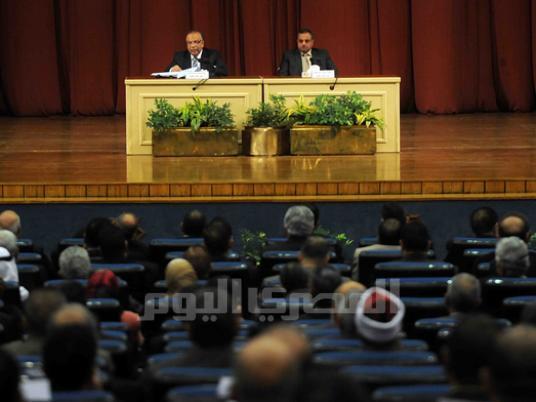
An issue that has enraged Parliament members in the Budget and Planning Committee over the last few months, and those fighting against corruption for over a year at the Central Auditing Organization (CAO), has been that of so-called “private funds.”
Private funds are money outside the state budget collected through indirect taxes and fees by various government entities across the country to spend as they see fit.
Until the revolution, few people had heard about these funds. But, with the election of a new Parliament in January, it is an issue that has come to public attention.
Official figures, cited by Finance Minister Mumtaz al-Saeed to the local press, is that there are 4,750 funds, of which 4,228 are in local currency and worth LE30.2 billion, while 522 funds are in foreign currency and worth LE6.8 billion. An additional LE8.8 billion are held by public and private banks and belong to unknown sources.
On 22 April, Saeed was quoted by the Muslim Brotherhood’s Freedom and Justice daily as saying that “these funds are held by the CBE according to the Law of 2006, which ordered their transfer from commercial banks to the Central Bank. This happened during 2006, 2007 and 2008.”
Parliament members, auditors and presidential candidates have been pushing for their incorporation into the state budget, a move that the Finance Ministry recently said it is studying for the next two budgets of the financial years 2012-13 and 2013-14.
In the meantime, the ministry released a statement on 23 April ordering banks to freeze the accounts of private funds held by commercial banks which amount to some LE8.8 billion, so that they can be transferred to the treasury’s unified account held at the Central Bank.
“The money for these private funds is raised from the blood of Egyptians,” Ibrahim Yousry, a member of the CAO and founder of Monitors Against Corruption, told Egypt Independent in an interview. He has been working on this issue for over a year.
“If a university student wants a graduation certificate, the actual cost will be LE5 while the student is charged LE100. So, the extra LE95 goes to a private fund at the university. Or, the hospital’s entrance will charge a fee and this will go into the hospital’s fund. Municipalities charge parking fees and this will go into the municipality’s private fund,” Yousry explained.
These funds are seen as one more vehicle through which the government has robbed a country where 40 per cent of the population is considered poor, wasted spending and maintained a system of corruption in which wealth has been accumulated in the hands of a few.
“During the 114 days of this government, we haven’t seen any effort to clamp down on corruption in these private funds … Can you imagine that one fund earns LE100 million annually that is distributed among 172 persons? And one of those persons earns LE160,000 per month,” Ashraf Badr al-Din, deputy head of the Budget Parliament Committee, said in Parliament on 29 March.
He was addressing ministers in attendance, including Saeed, and challenged them to admit how much they take from private funds every month. They walked out shortly after.
There are accusations that a few of high-level government figures and public sector employees have been earning two wages, an official one from the state budget topped up by one from private funds.
The Central Bank of Egypt and the Finance Ministry could not be reached for comment.
Yousry says that money from the funds also goes to loyalty payments, bonuses and supporting a system of patronage. This is particularly so among military and police officer cadres.
The Interior Ministry’s private fund under Habib al-Adly had LE2 billion to be spent as the ministry wishes, according to Saad Aboud, head of the Karama Party, speaking on a TV nightly talk show on 11 March.
One of the main problems with these funds is that they lack transparency and oversight. Inconsistent numbers about how many funds there are and how much they are worth have been put forward by the Finance Ministry, CAO and the press.
The CAO believes the number of private funds is actually much higher than the one cited by the Ministry of Finance.
“There are 5,600 funds held by the CBE,” Yousry said. “Their annual income is LE150 billion, while they spend LE110 billion. So what’s left is LE40 billion.”
He complained that when people cite figures relating to the private funds they often don’t explain whether this refers to their annual income or how much the funds are worth after annual expenses.
Khaled Ali, lawyer and presidential candidate, for example, is quoted in newspapers on 26 April saying that the budget for annual funds is LE100 billion and not LE35 billion as the government states; though he could be referring to the pre-expenses amount, while the government is referring to their net worth.
Over the years, there has been little cooperation between the CAO and CBE to monitor these funds. Oversight has been “limited and faced with many difficulties” Yousry said.
Private funds date back to the early 1970s and are governed by Law 53 of 1973.
“They were not that big through the 1970s and 1980s, in terms of total expenditure or revenue,” Amr Adly, economic and social justice director at the Egyptian Initiative for Personal Rights, explained. “These funds expanded a lot in the 1990s and this had to do with the adoption of the Structural Adjustment Program in 1991. The program involved budget cuts to bring down the budget deficit, which was quite large in the late 1980s.”
After budget cuts go local governorates, Adly said officials started compensating for the cuts by depending on private, extra-budgetary funds and local taxes.
For Adly, this is unconstitutional.
“You cannot impose taxes, however small they may be, without issuing a law from Parliament,” he said. “And if they’re made up of state revenue, then they have to be totally under the supervision of Parliament. This extra-budgetary system violates the constitutional principle of a unitary budget.”
“The CAO and Ministry of Finance have to write down precise reports about what we have and audit them. My reading is that it will take a couple of years before all the legal, technical and financial problems will be resolved to have them reintegrated into the budget,” Adly said.
In the context of an economy suffering from a high budget deficit, low foreign reserves, and negotiations for unpopular external loans, including with the International Monetary Fund (IMF) and Gulf States, the Budget Parliament Committee and others have been pushing the government to admit to resources the country has domestically.
The Muslim Brotherhood’s Freedom and Justice Party (FJP) has consistently said that there are alternative sources of funding that Egypt can look to before resorting to external loans, including private funds.
If the funds are officially worth a total of LE45.8 billion, based on the Finance Ministry's numbers, this is equivalent to $7.5 billion;* an addition to the budget much higher than the $3.2 billion loan Egypt is negotiating with the IMF.
* Correction: This sentence initially read "If the funds are worth a total of LE50 billion, this is equivalent to $8.2 billion" and has been corrected to reflect more accurate figures.




